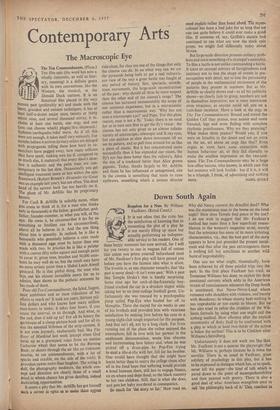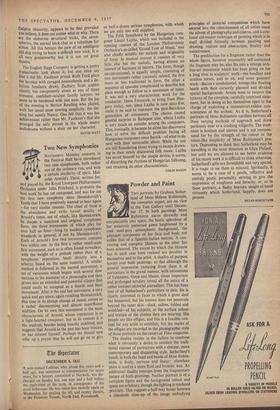Down South Again
IT is not often that the critic has the satisfaction of knowing that in recounting the plot of a play he is not merely filling up space but actually performing an indispens-
_ able service to his readers. One of these happy moments has now arrived, for I will lay you twenty to one in wagons full of cotton that unless you prime yourself beforehand most of Mr. Faulkner's first play will have passed you before you have the faintest idea what is afoot. The trouble is, as one character remarks, that 'the past is never dead—it isn't even past.' With a past like Temple Drake's this is hardly surprising. Some time ago her cock-of-the-fraternity boy- friend crashed the car in a drunken stupor while taking her to an inter-college football game. Un- fortunately she was rescued by a psychopathic pimp called Pop-Eye who hauled her off to Memphis. There she stayed for six weeks in one of his brothels and provided him with vicarious satisfaction by making love before his eyes to a young night-club tough imported for the purpose. And that isn't all, not by a long chalk. Far from running out of the place she rather enjoyed the atmosphere, fell in love with her partner in the unpleasant demonstration, wrote him obscene and incriminating love letters and, when he was picked off a drain-pipe by Pop-Eye trying to steal a tete-a-tete with her, fell for his brother. One would have thought that she might have learnt better than to marry the college chum after all in the fond hope that suffering would provide a bond between them, still less to engage Nancy, an ex-whore and dope fiend, as the black mammy to her two children. Still, that is what she does, and gets her baby murdered in consequence.
So much for 'the story so far.' Now read on. Why did Nancy commit the dreadful deed? Who was the mysterious man in the house on the fatal night? How does Temple find peace at the last? I do not wish to suggest that Mr. Faulkner's method has more than a few superficial resem- blances to the woman's magazine serial, merely that the substance has some of its more irritating characteristics, viz., that the best part of the story appears to have just preceded the present instal- ment and that after the past extravagances there is nothing left but anticlimax or another wild burst of improbability.
One can see what might, theoretically, have been achieved by all these painful trips into the past. In the first place Faulkner has tried, as Tennessee Williams has done, to exploit the deep emotional currents which eddy in the American stream of consciousness whenever the Deep South is mentioned, that Never-Never-Land where romance rubs shoulders with violence, and beauty with decadence; in whose steamy heat nothing is too improbable or too exotic to bloom. But he has also tried to refine the crudities of the Wil- liams formula by using what one might call the iceberg method. How effective after the explicit monstrosity of Baby Doll to be confronted with a play in which at least two-thirds of the action is below the surface! This is to be Chekhov after Williams's Strindberg.
Unfortunately it does not work out like that. Mr. Faulkner is not a quarter the playwright that Mr. Williams is, perhaps because he is twice the novelist. There is, as usual in Faulkner, great subtlety of psychology in this play, but it has to be expressed in dialogue which has, so to speak, never left the paper—the kind of talk which is pared down to the point of incomprehensibility and then painted with poetry. There is also a good deal of what American evangelists used to call 'the philosophy back of it.' This, couched in
Delphic obscurity, appears to be that provided you believe, it does not matter what or why. There are the elaborate structural tricks, the atmo- spherics, the eternal back-chat as a substitute for action. All this betrays the paw of an intelligent old dog trying to learn a difficult new trick. It is all very praiseworthy but it is not yet great theatre.
The English Stage Company is getting a pretty transatlantic look about it, but one must say that it did Mr. Faulkner proud. Ruth Ford plays the heroine with ravaged neurasthenia and a de- licious Southern drawl, Zachary Scott ambles silently but competently about as one of those tiresome, confidant-catalyst family lawyers we seem to be burdened with just now. But the joy of the evening is Bertice Reading who played, with her usual most moving simplicity, the sin- ning but saintly Nancy. One felt that it was her achievement rather than Mr. Faulkner's that she emerged the only person in the whole seamy melodrama without a stain on her character.
DAVID WATT















































 Previous page
Previous page